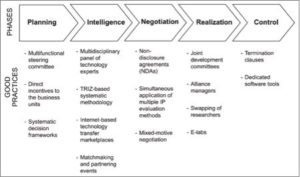“Extracting revenues from the sale of technology remains a challenge for most firms. The gap between the few pioneering companies that earn millions of dollars in royalties (e.g. IBM) and the majority, which fail to achieve any significant benefits is huge” p. 19
Selling technological knowledge is complex, and even for a company that possesses a breakthrough or radically innovative technology, there is no guarantee that the technology would be successfully sold or commercialised.
The technology sale process is dogged by several difficulties that only a few companies (such as IBM) have learn to overcome. This process, which can be described in 5 steps of planning, intelligence, negotiation, realisation and  control was studied by the authors across 30 companies. They were able to identify challenges faced in each step and provided a set of managerial solutions.
control was studied by the authors across 30 companies. They were able to identify challenges faced in each step and provided a set of managerial solutions.
The planning stage involves decision-making on which technologies should be retained, and which should be exploited externally. The main challenge here is the cognitive barrier of managers to selling technological knowledge. To overcome this, some of the businesses studied:
- Created committees responsible for technology exploitation decisions
- Rewarded business units that pursue exploitation opportunities
- Used systematic frameworks that guide managers’ keep-or-sell choices.
Good practices in managing technology-sale transactions (p.22 Bianchi et al., 2011)
The intelligence stage focuses on the identification of sales opportunities and the choice of suitable partner. Ways to reduce the significant uncertainties surrounding this stage include: –
- Setting up panels of diverse technology experts to identify obscure applications of the technology
- Reaching out through technology transfer marketplaces to other companies that have an interest in the technology.
In negotiation there is communication of the intention to sell and this disclosure means that the company needs to reveal aspects of its technology. In addition to the challenge of knowing how much to reveal, there is usually uncertainty as to the economic value of the technology. Here companies may choose to:
- Set-up NDAs with potential partners
- Combine IP evaluation methods and market-based information to provide more accurate evaluation of technology value.
The realisation stage focuses on the transfer of the technology between the parties involved in the sale. There is a need to minimise the risk of deal-breaking complications at this stage, and to do this,
- The partners can choose to set up joint development committees to collaborate effectively through the transfer process
- Alliance managers may be appointed by the selling firm to monitor progress and resolve conflicts.
The complexities in the control stage, which focuses on monitoring partner’s behaviour and compliance, include being able to identify contractual infringements by the buyer. One way by which firms may choose to manage this is to insert appropriate termination clauses in agreements.
It is important to note that these insights provided by Bianch, Chiesa and Frattini are general managerial solutions and should be applied in to suit the context of the actual technology sale situation faced by your business.
Read the full paper:
Selling technological knowledge: Managing the complexities of technology transactions, M. Bianchi, V. Chiesa, & F. Frattini, Research-Technology Management, 2011
Recommended by and post by Imoh Ilevbare

